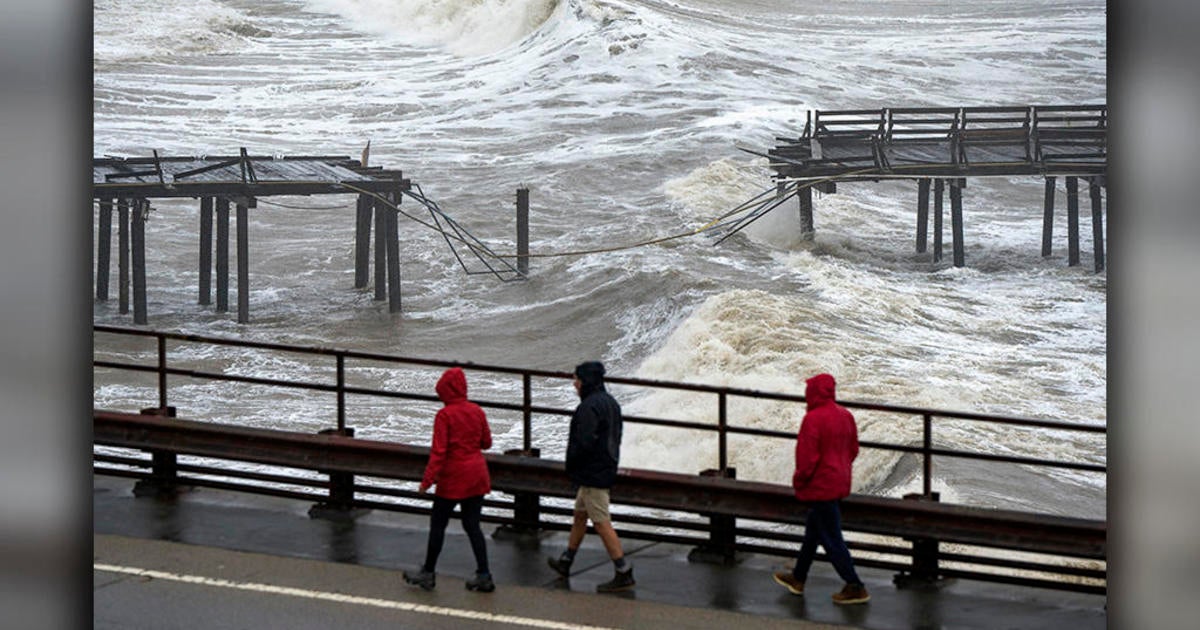


Santa Cruz Wharf in California collapsed during a high surf on Monday, sending three people into the water. The public has been warned to stay away from the area as strong winds and storms are expected to hit the US West Coast this week. Two of the three people were rescued by lifeguards, while the third person managed to swim to safety. Videos and photos of the incident have been shared online, showing the extent of the damage caused by the storm.
Santa Cruz Wharf Collapse: A Reminder of Coastal Erosion Dangers
On Monday, amidst raging surf and howling winds, a section of the iconic Santa Cruz Wharf in California collapsed, sending three people plummeting into the frigid waters below. The incident has raised concerns about the vulnerability of coastal infrastructure to the increasing frequency and intensity of storms due to climate change.
Background
The Santa Cruz Wharf, a historic landmark spanning 2,745 feet, has been a beloved destination for decades. Built in 1914, it features a vibrant mix of restaurants, shops, and fishing boats. However, the wharf has faced ongoing challenges from erosion and storm surges, which have weakened its foundation over time.
Collapse Details
At approximately 10:30 AM on Monday, a 100-foot section of the wharf gave way under the weight of the waves crashing against it. Three people were on the affected area at the time. Two were quickly rescued by lifeguards, while the third managed to swim to safety.
Injuries and Damage
Fortunately, no major injuries were reported, but the collapse caused significant damage to the wharf and surrounding areas. The weakened portion of the wharf remains collapsed, and the rest of the structure has been closed to the public for safety reasons.
Response and Warnings
Lifeguards and emergency responders were quickly on the scene to assist the victims and clear the area. The Santa Cruz Police Department has urged the public to stay away from the wharf and the surrounding beach due to the potential for further collapse and strong winds.
Coastal Erosion and Climate Change
The Santa Cruz Wharf collapse highlights the pressing issue of coastal erosion, which is exacerbated by rising sea levels and more frequent storms. Climate change is leading to warmer ocean temperatures, melting glaciers, and expanding sea ice, all of which contribute to coastal erosion.
As coastal areas become more vulnerable, infrastructure, property, and lives are at risk. Governments and communities need to prioritize coastal protection measures, including beach nourishment, seawalls, and other structural defenses.
Top 5 FAQs
Q1: What caused the wharf collapse? A: The collapse was likely due to a combination of erosion, storm surge, and wave action.
Q2: Were there any injuries? A: No major injuries were reported, but minor injuries are possible.
Q3: Is the wharf open to the public? A: No, the wharf is closed until further notice due to safety concerns.
Q4: What is being done to address the collapse? A: Engineers are assessing the damage and determining the necessary repairs.
Q5: What are the long-term implications of coastal erosion? A: Coastal erosion can damage infrastructure, property, and ecosystems, and displace communities. Mitigation measures are needed to protect coastal areas.
The Santa Cruz Wharf collapse serves as a stark reminder of the challenges facing coastal communities in the face of climate change. It underscores the urgent need for proactive measures to protect these vulnerable areas and ensure the safety of their residents and visitors.

Chief Election Commissioner Gyanesh Kumar flagged off 14 participants from 7 countries as part of the International Election Visitors’ Programme 2025 to witness voting in the Phase-I of the Bihar Assembly Elections. The participants attended an inaugural session and were provided with a demonstration of the EVMs and a presentation on various aspects of elections in India. The participants will then embark on a two-day tour of Bihar to visit EVM dispatch centers and witness the actual polling on November 6. Since 2014, the IEVP has been showcasing the strengths of India's electoral system and sharing best practices with international election management bodies. The first phase of the Bihar Assembly elections, featuring 121 constituencies and over 3 crore voters, will be held on November 6.

The recent police raid in Brazil, which resulted in one of the deadliest operations in Rio's history, has sparked outrage and protests. Families of the victims claimed that their loved ones were executed by the police, while the government celebrates it as a win against crime. Shocking images of bodies lined up in the street have led to widespread protests and accusations of police brutality. However, official reports and videos of victims' bodies suggest that the deaths were not a result of armed conflict, raising questions about the excessive use of force by the police.

Four people have died and 11 have been injured after a UPS cargo plane crashed near Louisville Muhammad Ali International Airport in Kentucky. All flights in and out of the airport have been suspended as police and emergency services are attending the scene. Kentucky governor Andy Beshear has described the accident as "catastrophic" and is urging residents to obey any shelter-in-place orders.

Eight people have been killed and numerous others injured after a passenger train collided with a goods train in Chhattisgarh. The accident occurred in the afternoon, halting train services on the route and prompting the cancellation or diversion of multiple trains. Emergency teams have been dispatched to the scene, with rescue operations ongoing and medical treatment being provided to the injured passengers. Helpline numbers have been issued for convenience, and the railway authorities have assured that all efforts are being made to assist those affected by the tragedy.

Today, 5 November 2025, marks the 556th birth anniversary of Guru Nanak Dev Ji, the founder of Sikhism. As we celebrate this sacred and highly revered festival, let us remember and spread the teachings of Guru Nanak Dev Ji, which promote compassion, humility, and love for all. To commemorate this occasion, indianexpress.com has compiled heartfelt wishes and messages to share with friends and family, wishing everyone endless happiness, peace, and prosperity.

During the Emerging Science Technology and Innovation Conclave, PM Modi announced the launch of the Rs 1 lakh crore Research, Development and Innovation Fund. This fund, under the Department of Science and Technology, aims to encourage private sector investments in R&D to drive India's vision of becoming an innovation-driven nation. With this fund, India's R&D expenditure has doubled in the last decade and the country now has the world's third-largest startup ecosystem. PM Modi also highlighted how India's domestic capability has accelerated during the COVID-19 pandemic due to its successful digital public infrastructure.

A stampede at the Kasibugga Venkateswara Swamy Temple in Andhra Pradesh has left 10 dead and two injured. The temple had recently reopened and was experiencing high footfall due to a festival. Home Minister Vangalapudi Anitha has ordered a thorough investigation into the causes of the tragedy and has promised strict measures to prevent similar incidents in the future.

India and the United States have strengthened their already strong ties by signing a 10-year framework for their major defense partnership. The agreement, signed during a bilateral meeting between the two countries' defense ministers, emphasizes the importance of this partnership in maintaining a free and open Indo-Pacific region. This marks a significant step in solidifying the bond between India and the US in the defense sector.

In preparation for a major tri-service military drill, India has issued Notices to Airmen (NOTAM) for the entire northeastern region that borders China, Bhutan, Myanmar, and Bangladesh. The first set of exercises will commence in November and continue through January, signaling enhanced operational readiness for the Indian Air Force (IAF). This move is significant as the Northeast remains a sensitive theater, making up the boundary with four countries, including China. The upcoming IAF exercises aim to strengthen India's air dominance, effectively preparing for any potential challenges along the western frontier with Pakistan.

India will conduct a 10-day military exercise in Rajasthan and Gujarat involving the Army, Air Force, and Navy to showcase its operational readiness following Operation Sindoor earlier this year. The exercise, announced through a NOTAM, features advanced military technologies and emphasises the integration of speed, firepower, and precision in desert warfare conditions. It comes amidst heightened tensions with Pakistan and a renewed focus on maintaining military readiness along the border.